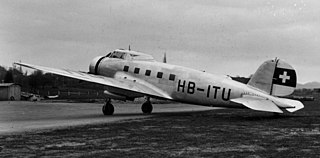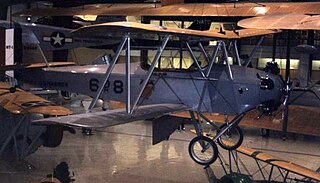
The Naval Aircraft Factory XN5N was a prototype United States monoplane trainer aircraft produced by the Naval Aircraft Factory in Philadelphia, Pennsylvania in 1941. A single prototype was built and evaluated.

The Aeronca L is a 1930s American cabin monoplane designed and built, in small numbers, by Aeronca Aircraft. It differed significantly from other Aeronca planes by the use of radial engines, streamlining, and a cantilever low wing.
The Kinner Sportster was a 1930s American light monoplane built by Kinner Airplane & Motor Corporation.

The Kinner Sportwing was a 1930s American light monoplane built by Kinner Airplane & Motor Corporation.

The General Aviation GA-43 was a single engine low-wing monoplane airliner produced in small numbers in the United States in the mid-1930s, also known as the Pilgrim 150, Fairchild 150, and sometimes but erroneously as the Clark GA-43 for the designer, Virginius E. Clark who was also responsible for the Clark Y airfoil section used.

The New Standard D-29 is a trainer aircraft produced in the US from 1929 to 1930. It was a conventional biplane design with a fuselage constructed from duralumin members riveted and bolted together, and the wings were made with spruce spars and bass-wood and plywood built-up ribs. Deliberately built to be rugged and simple the D-29 was moderately successful, but had to compete with the Swallow TP.

The Mutual Blackbird was a late 1920s two-seat open cockpit sporting biplane.

The Driggs Dart was an American-built light sporting aircraft of the late 1920s.

The Stout Skycar is a series of four one-off American light aircraft of the 1930s.
The Security Airster S-1 is an American two-seat single-engined monoplane designed by Bert Kinner and built by his Security National Aircraft Corporation later named the American Aircraft Corporation.

The Mohawk M1C was a 1920s American two or three-seat low-wing monoplane designed and built by Mohawk Aero Corporation of Minneapolis, Minnesota. One M1C was evaluated by the United States Army Air Corps in 1930 as the YPT-7 Pinto for use as a primary trainer.

The Aeronca 12AC Chum was a 2-seat cabin monoplane designed and produced by Aeronca in the United States in 1946. The design was a licence-built version of the ERCO Ercoupe.
The St. Louis C2 Cardinal family are a series of light sport monoplanes built by the St. Louis Aircraft Corporation during the peak of the Lindbergh Boom after the Spirit of St. Louis flight of 1927.

The Elias EC-1 Aircoupe was an American two-seat parasol wing monoplane designed and built by Elias of Buffalo, New York.
The Timm Aircoach, also called the Timm Coach and the Golden Shell Special, was a custom-built, high-capacity, high altitude aircraft for charter flights.
The Corcoran 65-1 was a motor glider of very unusual configuration, a twin engine biplane. It was designed and built in the United States in the 1960s; only two were completed.

The Bach "Super Transport" was a design for a four-engined transport aircraft that was never built.
The Yackey Monoplane was an American three seat parasol monoplane flown in the late 1920s. Two prototypes had some success in the 1927 New York - Spokane National Air Derby and orders were placed but a crash killed its designer and ended production.
The Simplex Red Arrow was a US single-engined monoplane produced in the late 1920s and early 1930s and intended as club machine or mail transport. Most used radial engines in the 90–110 hp (67–82 kW) range. They carried one or two passengers whose seats could be open or enclosed. One variant, the Red Arrow Dual Plane, was easily converted from monoplane to biplane and was available with two versions of the much more powerful Wright Whirlwind engines. In all about 20 were built.
The States Super Monoplane was a tandem two seat, civil sport and trainer aircraft built in small numbers at the start of the U.S Great Depression.












